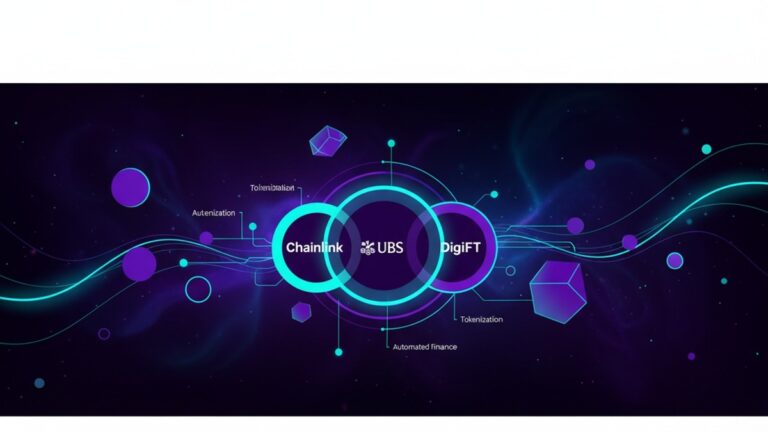In a move that could revolutionize the financial landscape, Chainlink, UBS, and DigiFT have embarked on a pioneering project in Hong Kong. The three companies announced a pilot program designed to test blockchain infrastructure, with the goal of automating the distribution, settlement, and management of tokenized products. This collaboration signifies a notable advance in the adoption of digital assets within mainstream financial services.
A New Era for Tokenization
Blockchain technology has long promised to streamline and enhance various processes within the financial sector. By automating aspects of fund management, Chainlink, UBS, and DigiFT hope to demonstrate the tangible benefits of blockchain, including increased transparency, reduced costs, and improved efficiency. Tokenization, the process of converting rights to an asset into a digital token on a blockchain, is at the core of this endeavor.
The pilot aims to test the practical application of these ideas in a real-world setting. If successful, it could set a precedent for other financial institutions looking to harness the power of blockchain technology. The focus will be on evaluating the operational efficiencies gained through automation, assessing risk management improvements, and ensuring regulatory compliance in the rapidly evolving digital landscape.
Why Hong Kong?
Hong Kong’s status as a global financial hub makes it an ideal location for this pilot. The city boasts a robust regulatory framework, a highly developed financial market, and a forward-thinking approach to fintech innovation. These factors combine to create an environment conducive to testing cutting-edge technologies.
Furthermore, Hong Kong’s government has shown support for blockchain technology and digital assets, providing a fertile ground for such initiatives. With a clear regulatory environment and a tech-savvy populace, Hong Kong offers a unique opportunity for Chainlink, UBS, and DigiFT to showcase the potential of tokenized products.
The Role of Chainlink, UBS, and DigiFT
Each company brings a unique set of skills and expertise to the table. Chainlink, known for its decentralized oracle networks, provides the essential infrastructure to connect smart contracts with real-world data. This capability is crucial for automating processes and ensuring the accuracy and reliability of the tokenized products.
UBS, a global financial institution, adds its extensive experience in managing assets and navigating complex regulatory landscapes. Its involvement not only lends credibility to the project but also ensures that the pilot adheres to the highest standards of financial management and compliance.
Meanwhile, DigiFT, a digital asset platform, contributes its expertise in tokenization and trading. With experience in deploying blockchain solutions, DigiFT aims to facilitate the seamless operation of tokenized funds, making them accessible to a broader range of investors.
Potential Benefits and Challenges
The potential benefits of this pilot are significant. By automating the distribution and settlement processes, the involved companies aim to reduce operational costs and minimize human error. This could lead to faster transaction times and increased liquidity in the market. Additionally, the use of blockchain technology can enhance transparency, providing investors with greater insight into their investments.
However, challenges remain. Regulatory compliance is a complex issue, particularly in the context of rapidly evolving digital asset regulations. Ensuring that the pilot adheres to all relevant laws and guidelines will be crucial to its success. Additionally, the technology itself must prove reliable and secure, with robust mechanisms in place to protect against cyber threats and data breaches.
What This Means for the Future
The success of this pilot could have far-reaching implications for the financial industry. Should the automation of tokenized products prove viable, it may pave the way for widespread adoption of similar technologies. This could lead to a more efficient, transparent, and inclusive financial ecosystem.
Investors, too, stand to benefit. With easier access to a wider range of investment opportunities, they could enjoy greater diversification and potentially higher returns. Moreover, the increased transparency afforded by blockchain technology could enhance trust and confidence in the market.
Conclusion
The collaboration between Chainlink, UBS, and DigiFT in launching a pilot for automated tokenization in Hong Kong marks a significant step forward in the integration of blockchain technology within the financial sector. While challenges remain, the potential benefits are substantial, promising a more efficient and transparent future for both institutions and investors.
As the pilot progresses, the industry will be watching closely. The outcomes could redefine the way we think about asset management and digital innovation, setting new standards for what’s possible in the world of finance.

Steve Gregory is a lawyer in the United States who specializes in licensing for cryptocurrency companies and products. Steve began his career as an attorney in 2015 but made the switch to working in cryptocurrency full time shortly after joining the original team at Gemini Trust Company, an early cryptocurrency exchange based in New York City. Steve then joined CEX.io and was able to launch their regulated US-based cryptocurrency. Steve then went on to become the CEO at currency.com when he ran for four years and was able to lead currency.com to being fully acquired in 2025.


